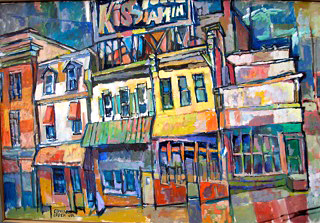But meanwhile, as the rest of the world starts "catching up" with viable economies and jobs (some of which we've shipped to them) and stuff, America is left with limited opportunity for our own working people. We sink, so that they can rise. (I think...?)
And that affects the whole economy, in our country; people who aren't making much money cannot spend much money. The economy sssslllloooowwwwssss dddoooowwwnnnnnn...
A guy told me the other day he didn't use his truck for about a year because it wouldn't run; the mechanic work necessary was too expensive. This is a man who has a full-time job. (And other vehicles.)
But then -- "my friend fix it for me; twenty dollars."
A new underground economy.
In 1931, when there weren't enough jobs, this song came out:
They used to tell me I was building a dream, and so I followed the mob,
When there was earth to plow, or guns to bear, I was always there right on the job.
They used to tell me I was building a dream, with peace and glory ahead,
Why should I be standing in line, just waiting for bread?
Once I built a railroad, I made it run, made it race against time.
Once I built a railroad; now it's done. Brother, can you spare a dime?
Once I built a tower, up to the sun, brick, and rivet, and lime;
Once I built a tower, now it's done. Brother, can you spare a dime?
Once in khaki suits, gee we looked swell,
Full of that Yankee Doodly Dum,
Half a million boots went slogging through Hell,
And I was the kid with the drum!
Say, don't you remember, they called me Al; it was Al all the time.
Why don't you remember, I'm your pal? Buddy, can you spare a dime?
a hit for Bing Crosby
lyrics by Yip Harburg, music by Jay Gorney (1931)
{Google -- type in "bing crosby brother can you spare a dime" and press "enter" >> You Tube, it comes right up}
---------------------------------------------
This time it is not as bad as the depression; people don't have to stand in line to receive bread, or ask for a dime.
It is a shake-up, however.
Some people -- working people, career people -- are approaching the current lack of opportunities by getting in tune with the minimalist movement. You buy less; own less; experience more. You "live with intention," doing the things you actually want to do, instead of doing the things which the consumer-culture programs us to do, which is buy moreandmoreandmore...
People start asking themselves questions like, "Why did I think buying and owning a lot of shit was going to make me happy? Once I own it, I have to organize it, deal with it, move it around, clean it, make decisions about it...what did I just spend my entire weekend doing...?" for example.
The guy at the "Becoming Minimalist" site discusses these ideas and viewpoints.
----------------------
{The New Yorker. "Bay Watched." by Nathan Heller} excerpt --------------------- In 1966, Hendrik Hertzberg, then a young Newsweek reporter in the Bay Area, wrote about San Francisco's "new bohemianism":
The hippies, much more numerous than the Beats ever were, accentuate the positive. . . . Like the Beats, they are dropouts from the conventional "status games," but, unlike them, have created their own happy lifestyles to drop into. "In a way," says Jerry Garcia, twenty-four, lead guitarist of the Grateful Dead and one of the cultural heroes of Haight-Ashbury, "we're searching for respectability -- not Ford or GM respectability, but the respectability of a community supporting itself financially and spiritually."
The youth, the upward dreams, the emphasis on life style over other status markers, the disdain for industrial hierarchy, the social benefits of good deeds and warm thoughts -- only proper nouns distinguish this description from a portrait of the startup culture in the Bay Area today. It is startling to realize that urban tech life is the closest heir to the spirit of the sixties, and its creative efflorescence, that the country has so far produced.
-30-

No comments:
Post a Comment